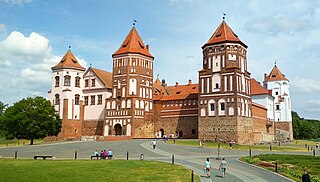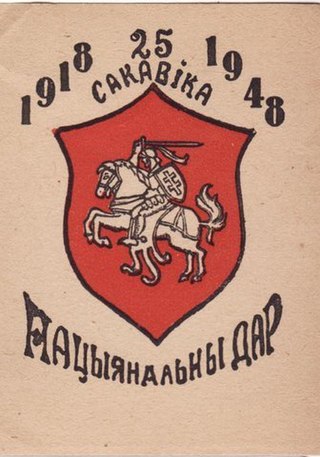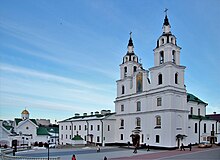
Minsk is the capital and the largest city of Belarus, located on the Svislach and the now subterranean Niamiha rivers. As the capital, Minsk has a special administrative status in Belarus and is the administrative centre of Minsk Region and Minsk District. As of 2024, it has a population of about two million, making Minsk the 11th-most populous city in Europe. Minsk is one of the administrative capitals of the Commonwealth of Independent States (CIS) and the Eurasian Economic Union (EAEU).

Mogilev, also transliterated as Mahilyow, is a city in eastern Belarus. It is located on the Dnieper River, about 76 kilometres from the border with Russia's Smolensk Oblast and 105 km from Bryansk Oblast. As of 2024, it has a population of 353,110. In 2011, its population was 360,918, up from an estimated 106,000 in 1956. It serves as the administrative centre of Mogilev Region, and is the third-largest city in Belarus.

Grodno Region, also known as Grodno Oblast or Hrodna Voblasts, is one of the regions of Belarus. Its administrative center, Grodno, is the largest city in the region. As of 2024, it has a population of 992,556.

The Belarusian People's Republic, also known as the Belarusian Democratic Republic, was a state proclaimed by the Council of the Belarusian Democratic Republic in its Second Constituent Charter on 9 March 1918 during World War I. The Council proclaimed the Belarusian Democratic Republic independent in its Third Constituent Charter on 25 March 1918 during the occupation of contemporary Belarus by the Imperial German Army.
European Radio for Belarus, also known as Euroradio, is an international radio station that provides independent news, information, and entertainment to the citizens of Belarus. It launched on 26 February 2006. ERB operates on FM, OIRT FM, Internet, and Satellite to reach the widest audience. Its staff includes around 20 people in the Warsaw office and ten journalists in the Minsk office.

The Party of Freedom and Progress is a liberal political party in Belarus. Since 2003, it has continuously failed to reach the minimum threshold to get an official registration by the electoral commission.
The Belarusian LGBT Human Rights Project GayBelarus is a national youth civic association. They operate the Jáhada positive queer infoportal.

The Rada of the Belarusian National Republic was the governing body of the Belarusian Democratic Republic. Since 1919, the Rada BNR has been in exile where it has preserved its existence among the Belarusian diaspora as an advocacy group promoting support to Belarusian independence and democracy in Belarus among Western policymakers. As of 2024, the Rada BNR is the oldest existing government in exile.

The Diocese of Minsk is an eparchy of the Belarusian Orthodox Church, which is an exarchate of the Russian Orthodox Church.
Edward Zinowevich Tarletski, also known by the stage names Norma Pospolita and Madame Zhu-Zhu is a Belarusian drag performer, recording artist, entertainer, journalist, gay activist, and costume designer, living in Stockholm, Sweden. He was born in Minsk, Belarus on 5 February 1969. Edward Tarletski graduated as a photographer and a journalist in European Humanities University (Minsk) in 1996. Since 2000, he has been a member of the Belarusian Association of Journalists.
Ivan Alexeyevich Charota is a Belarusian literary critic, Slavist, critic, historian of culture, translator. He is a Doctor of Philological Sciences 1998, and professor since 1999. He is a Laureat of the Republic of Belarus Prize for Spiritual Revival 2003. Foreign member of the Serbian Academy of Sciences and Arts 2009. Member of the Association of Writers of Belarus, the Association of Writers of Russia and the Association of Writers of Serbia 1985.

The Russification of Belarus denotes a historical process where the integration of Russian language and culture increasingly influenced Belarusian society, especially during the 20th century.
The COVID-19 pandemic in Belarus was a part of the worldwide pandemic of coronavirus disease 2019 caused by severe acute respiratory syndrome coronavirus 2. The virus was confirmed to have spread to Belarus, when the first case of COVID-19 in the country was registered in Minsk on 28 February 2020. As of 29 January 2023, a total of 19,047,714 vaccine doses have been administered.

The 2020–2021 Belarusian protests were a series of mass political demonstrations and protests against the Belarusian government and President Alexander Lukashenko. The largest anti-government protests in the history of Belarus, the demonstrations began in the lead-up to and during the 2020 presidential election, in which Lukashenko sought his sixth term in office. In response to the demonstrations, a number of relatively small pro-government rallies were held.

St Elisabeth Convent is a Russian Orthodox convent on the outskirts of Minsk, Belarus. Currently, it is the only functioning monastery in the city.

Belarus–NATO relations refers to relations between the Republic of Belarus and the North Atlantic Treaty Organization (NATO).

The Third Constituent Charter is a legal act adopted by the Rada of the Belarusian Democratic Republic on 25 March 1918 in Minsk, according to which the Belarusian People's Republic was proclaimed an independent state. The anniversary of this historic event is traditionally celebrated by Belarusians as the Freedom Day.

The German occupation of Byelorussia, now known as Belarus, started with Germany's invasion of the Russian Empire on August 1, 1914 and ended with the collapse of the German Empire on November 11, 1918. During the occupation, 130,000 Belarusians were killed.

Belarus, a close ally of Russia, has supported its eastern neighbour in the Russian invasion of Ukraine. Before the start of the offensive, Belarus allowed the Russian Armed Forces to perform weeks-long military drills on its territory; however, the Russian troops did not exit the country after they were supposed to finish. Belarus allowed Russia to stage part of the invasion from its territory, giving Russia the shortest possible land route to Ukraine's capital, Kyiv. However, these forces withdrew within two months, thus ceasing land-based military operations originating from Belarus and resulting in the recapture of the Ukrainian side of the border region by Ukraine. Despite this, the situation along the border remains tense, with Ukraine closing the border checkpoints leading into Belarus, bar special cases.

Metropolitan Benjamin (Belarusian: Мітрапаліт Веніямі́н; Russian: Митрополит Вениамин, romanized: Mitropolit Veniamin; secular name Vital Ivanavič Tupieka is a Belarusian Orthodox bishop currently serving as Metropolitan of Minsk and as Patriarchal Exarch of the Belarusian Orthodox Church since 2020. He has also been Metropolitan of Barysaŭ since 2010. He is the first Belarusian to be head of the Belarusian Orthodox Church.














